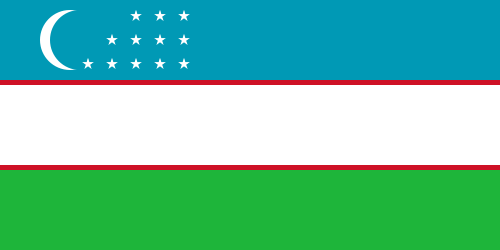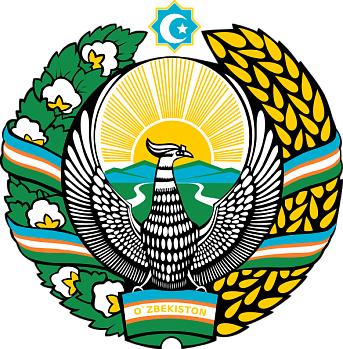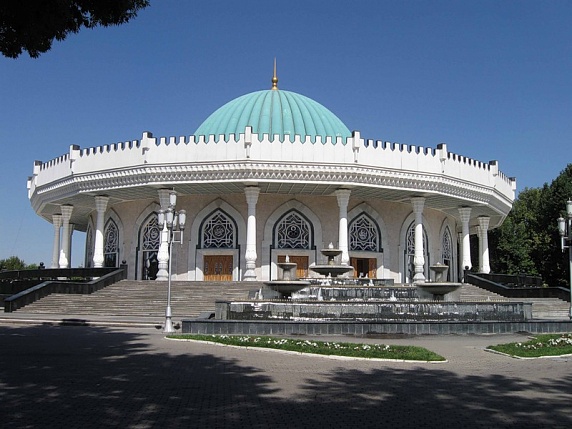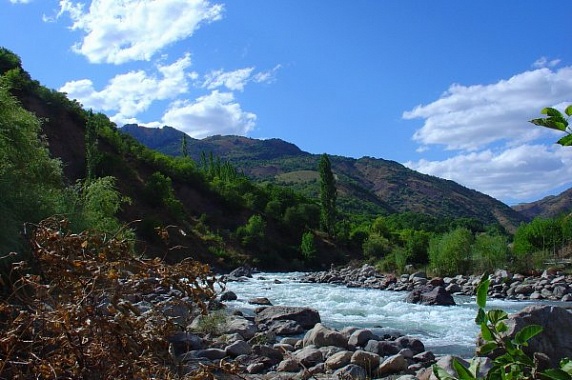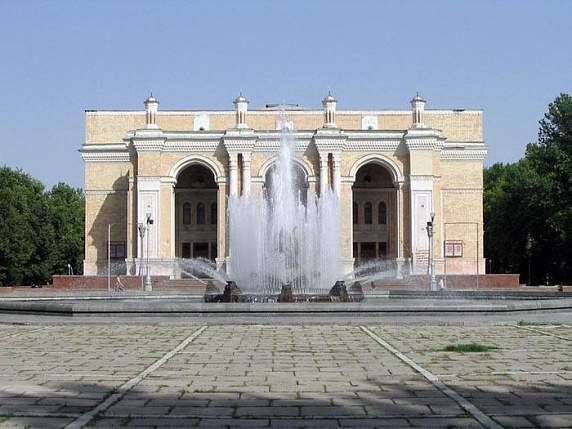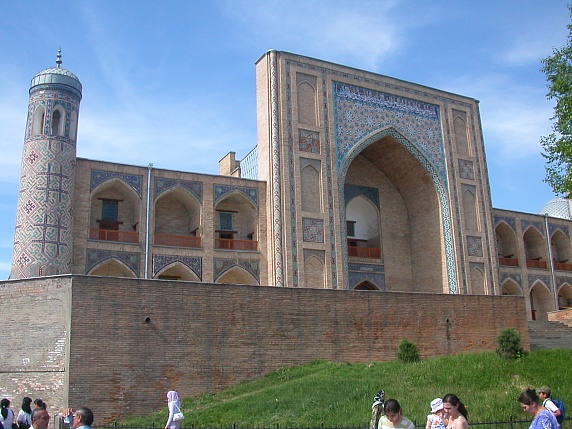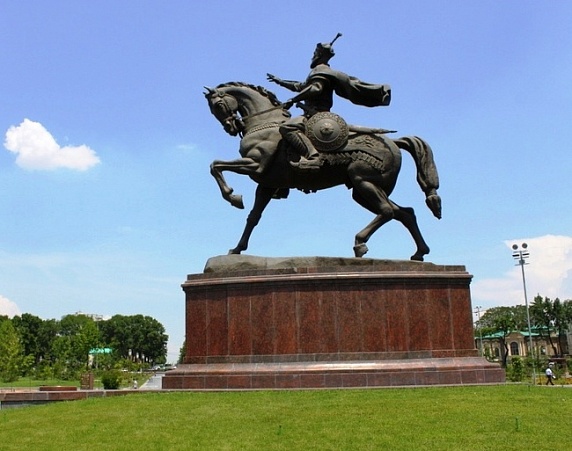 Республика Узбекистан
Республика Узбекистан
Transcript of Remarks and Replies to Media Questions by Russian Minister of Foreign Affairs Sergey Lavrov Following Talks with Netherlands Minister of Foreign Affairs Bernard Bot, The Hague, June 28, 2005
Unofficial translation from Russian
Foreign Minister Lavrov (speaks after Bernard Bot): I am pleased with the talks being held and I support what Foreign Minister Bot said, both in development of the accords between Russia and the EU on the "third" common space - for cooperation on external security - and on the bilateral plane. We appreciate that this was done openly. This enables us to find additional steps with regard to some or other international situations. In the framework of our relations with the EU we heard with gratitude the assessments that Netherlands Prime Minister Jan Peter Balkenende expressed this morning in conversation with me and which were supplemented by Netherlands Foreign Minister Bot in the course of our talks. We heard what matters most, notably that the internal problems which have temporarily arisen in the European Union will not affect the partnership between the Russian Federation and the EU. We have a common understanding that it is already necessary to think of reaching a new quality in the partnership between Russia and the EU, especially in light of the fact that the Partnership and Cooperation Agreement will expire in 2007. So that we will be working on it with our Western European colleagues and of course with the EU Presidency and the European Commission.
Apart from the international problems about which Netherlands Foreign Minister Bot has already said, we also devoted attention to the need to reform the OSCE. We agreed that issues related to the OSCE budget formation and, most important, institutional issues, the rules on whose basis the OSCE functions, should necessarily be cleared up within this year.
I am also very pleased with the discussion of the state of our bilateral relations. The Netherlands holds among the Western European countries the second place in trade with Russia and for investment in the Russian economy. We have a rich political dialogue, based on regular contacts between the leaders of the two states, very intensive cultural links, and humanitarian cooperation. All this, of course, is bolstered by the events of long-standing history that brought our countries together. All this will be reflected in the course of the preparation for the state visit of Russian President Vladimir Putin to the Netherlands at the beginning of November, this year. We agreed to intensify the preparation of specific documents for these talks.
Question: Will Russian cooperation with Iran change after the Iranian presidential elections?
Foreign Minister Lavrov: Why should we change our line in questions of international cooperation with respect to the peaceful atom with a specific country on the understanding, of course, that such cooperation is pursued both in strict accordance with our international obligations and within the framework of compliance with all the existing rules in the context of the nuclear weapons nonproliferation regime? It is on these principles that we have been pursuing our cooperation with Iran, which is expressed in the construction of the Bushehr Nuclear Plant, and it is only on these principles that we shall continue to do so.
Question: As far as is known, Lithuania and Poland will not participate in the 750th anniversary festivities to be held in Kaliningrad. Please explain the situation, because people in these countries are expressing surprise and displeasure with what has happened.
Foreign Minister Lavrov: The 750th anniversary of Kaliningrad is a Russian event. It will be observed by the Russian leadership in cooperation, of course, with the leadership of the Kaliningrad Region. A whole series of internal Russian activities are scheduled. In addition, a meeting of Russian President Vladimir Putin with FRG Federal Chancellor Gerhard Schroeder and French President Jacques Chirac is to be held. This meeting reflects the separate dialogue format that exists between the three leaders. They have already met in this composition more than once. Besides, there is to be the ceremony of naming Kaliningrad State University after Immanuel Kant on July 3. It is therefore more than natural that FRG Federal Chancellor Schroeder will be present at the ceremony.
As to the claims alleging that Poland and Lithuania are not invited to the celebrations, they do not reflect the reality. The leadership of the Kaliningrad Region has been planning events with the participation of the border regions, to which the representatives of the respective regions of the adjacent countries have been invited.
Question: For the second year in a row, Russia talks about revising the OSCE budget in connection with certain changes in world politics and in European relations. To what extent are the Europeans ready to reform the OSCE? Is a crisis of this Organization possible following the unexpected crisis that has arisen in other European structures, in particular in the European Commission?
You have confirmed that Uzbekistan was discussed at your talks. At what conclusion did you arrive? Is Russia's position on this issue understandable? Has anything been cleared up regarding the external forces which Russia claims were involved in the revolt in Uzbekistan?
Foreign Minister Lavrov (replies after Bernard Bot): I have already noted that the institutional reform is of extremely great significance, which means, as, in fact, the Eminent Persons Group has recommended, the necessity to convert the OSCE into a real organization with its own rules that would be agreed upon by all member countries and which would fix the procedures for OSCE activity in all spheres. This is important, so that we can, at last, understand who appoints the heads of the various OSCE field missions, including the missions concerned with election monitoring, who gives them powers and what kind of powers. If it is monitoring, then its results have apparently to be assessed by somebody. So far it turns out that the head of the Monitoring Mission passes verdict on the same day on which the monitoring took place. We do not know who appoints them and what is the procedure of appointment. The following episode indicates the serious importance of this question. When the OSCE mission in Yugoslavia was headed up by the notorious Ambassador Walker, and the tragic events had taken place at the village of Racek, Ambassador Walker together with journalists went there and, upon seeing several dozen dead bodies, immediately declared that that was an act of genocide. That statement gave many governments, which had been planning to use force to establish in Yugoslavia the order which seemed to them correct, pretext to say: "Our patience has exploded, we are using force." As is known, after that the European Union initiated the preparation of a report which was commissioned to pathological anatomists from Finland. The report was presented to the EU, and later handed over by the European Union to the International Tribunal for the former Yugoslavia. Some propositions of this report leaked into the press. From the leaks it followed that the conclusion of the pathological anatomists had refuted the statements of OSCE representative Walker that it was an act of genocide. On the contrary, the leaks gave a possibility to understand that those killed were soldiers, later disguised as civilians. We then asked that the report be presented to the members of the UN Security Council, because it was the UNSC that had set up the International Tribunal for the former Yugoslavia. We were refused. I personally spoke several times with Tribunal Prosecutor Carla Del Ponte. She under various pretexts, now citing confidentiality, now technical difficulties, acquainted the UNSC with only some resumes on this report, which did not give the answers to the main questions. Only recently one more attempt to get this report led to us being told that it had been lost. I dwelt on this in so much detail to show what significance a report of heads of OSCE missions has and what worth it may have. So we want to know who empowers them and just what they are empowered to do. Of course, it should be acceptable to all OSCE member countries, once these people are our representatives.
As to Uzbekistan, we have not yet discussed it. I do not want to prejudge either our talks, which will continue, or the conversations to be held today between Russian President Vladimir Putin and Uzbek President Islam Karimov. I shall only say that Russia considers it important that an inquiry does take place. We expect that the parliamentary inquiry within Uzbekistan that has been launched will be transparent. In this connection we regard the step to create a monitoring group for engagement with this inquiry from among the ambassadors who are accredited in Tashkent as very important. We think that the composition of this group might be expanded and other ambassadors who so far do not participate in this work but would be invited will join in. We are waiting for regular information on the progress in the inquiry. Of course, it is necessary that it should be comprehensive, including an investigation of the circumstances of the preparation and carrying out of the illegal actions of force by the group of persons who intruded into Andijan. I already had the opportunity to answer the question about some additional facts evidencing the involvement of members of various foreign extremist groups in that incident. Such facts do exist. Via available channels, we're engaged in additionally clarifying those circumstances in contact with competent services of other states which are able to trace down the situation in this region. I assure you that these facts are not built on sand, but on concrete realities.
A video recording of the press conference is posted on the Web site www.mid.ru
June 29, 2005
